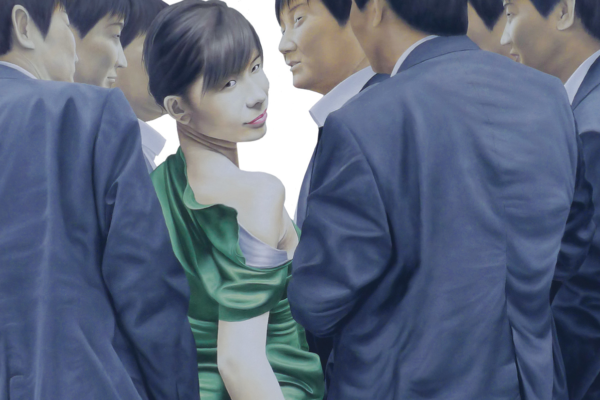Yan Lianke is the author of numerous short-story collections and novels, including The Four Books, Lenin’s Kisses, Serve the People!,and Dream of Ding Village, which was shortlisted for the Man Asian Literary Prize and the Independent Foreign Fiction Prize and adapted into a film. He was awarded two of China’s most prestigious literary honors, the Lu Xun Literary Prize and the Lao She Literary Award.
In early winter, when the air was cold and the ground was frozen, everyone stayed shacked up at home and the trees outside were barren. Sparrows circled under the eaves of the houses, and the entire village was enveloped in peace and tranquillity.
Kong Dongde was released from prison and returned home to the village. He returned surreptitiously, and no one even realized he was back. He spent the next month locked away in his house.
By this point he was sixty-two years old and had been in prison for the preceding twelve years. No one knew what he had endured, or what he had done there. He had knocked on the door of his house in the middle of the night, startling the household and bringing his wife and sons to tears. After this, the family fell silent and, apart from asking him what he wanted to eat or drink, no one said a single word.
He had originally been sentenced to death, and everyone in the village assumed he had already died. In the end, however, he returned alive. By this point his hair was gray and he was as thin as a reed. He sat so still that, had it not been for the slight movement of his eyes, he would have been indistinguishable from a corpse. Indeed, when he lay down, he no longer resembled a living person.
But after half a month of deathly silence, signs of life once again returned to his face. He called his sons over to his bed and made a series of astonishing pronouncements:
“The world has changed. In the future, production brigades will not be called production brigades, they will be called villages.
“. . . The land will be distributed back to the peasants, who will again be able to make a living.
“. . . In Explosion, the Zhu and Cheng families have met their end, and now it is time for our Kong family to take over.”
He had married at the age of twenty, and at the age of thirty he started having sons. Now, his four sons gazed at him like a litter of pups that were already grown and ready to go off on their own. Kong Mingguang was the eldest, followed by Kong Mingliang, Kong Mingyao, and Kong Minghui. They stood in a row in front of the bed, beneath which was a brazier of scholar-tree embers, the sweet fragrance of which filled the room and enveloped their faces in a yellow glow. When the gecko on the wall heard Kong Dongde’s soft voice, it turned to gaze at this man who appeared far older than his sixty-two years. The gecko’s clear, tiny round eyes were a combination of pitch black and pure white. Above Kong Dongde’s head, the gecko wagged its tail like a dog greeting its master, while the gray spider on the eastern wall also heard Kong Dongde’s voice, and when it turned in his direction, it lifted its head and exposed its belly.
“You should all leave,” Kong Dongde said, pointing to the door. His face, which had not smiled for over two weeks, appeared as though it were plated in gold. “You should all leave, and each of you should proceed in one of the four directions of the compass. You should continue forward without looking back, and when you find something you should pick it up—and whatever it is, it will determine your future life-course.”
His sons didn’t say a word, since they assumed their father had gone mad.
However, Kong Dongde repeated these instructions three times, almost as though he were begging them. Finally, Second Brother Kong Mingliang gave his elder brother Mingguang a meaningful look, then led their two younger brothers, Mingyao and Minghui, away from the brazier, the stools, their parents, the gecko, and the spider, as they all hesitantly made their way out the door.
Afterward, everything changed, and the world would never be the same. Following this juncture, the historical chronicles of Explosion entered a new phase.
When Kong Dongde’s sons left, their mother, who had been sitting on the edge of the bed staring at her husband, asked, “Are you ill?”
He replied, “I want a bottle of wine.”
She said, “You seem different.”
“Our family will produce an emperor,” he said. “But I don’t know which of our four sons it will be.”
His wife prepared to fetch him some wine and to make several small dishes to accompany it. During the time since Kong Dongde had returned, he hadn’t even touched her, as though he no longer had any interest in sex. But at that moment, as his sixty-year-old wife was about to leave, he grabbed her from behind and pulled her into bed, so that the bed once again became the site of those nearly forgotten sounds of screams and of clothes ripping.
It was the middle of the night, and the moonlight poured down like water.
The sparrows under the eaves of every house were tucked into their nests, and periodically they would emit a series of chirps and tweets. There was an exaggerated feeling of calm, and the shops that lined the village streets were like tombstones in a cemetery. After Kong Dongde’s four sons left home, they quickly arrived at the main intersection in front of the village. Mingliang said, “Let’s divide up, and each of us can proceed in a different direction. As soon as anyone finds something, he should return here.”
They parted ways and proceeded north, south, east, and west, respectively.
The eldest son went east, the second went west, the third went south, and the fourth went north, like four chicks leaving the nest in the middle of the night. The village was located at the base of a mountain, and the main road ran from east to west, while there was a smaller alley running from north to south. The intersection was located to the east of the village, and therefore the eldest, third, and fourth sons quickly left it behind, while the second son, Kong Mingliang, had to first go back through the village itself. In the depths of night, apart from moonlight, air, and the sound of dogs barking, he initially didn’t encounter anything.
But just as he was losing hope, he heard the sound of gates opening.
The gates in question were located in the village’s only tile-roof gatehouse, which had wide double-paneled willow gates that had just been painted red. The gates creaked open; they were also red and emitted a pungent smell of fresh paint. This was the home of the former village chief, Zhu Qingfang. After the gates opened, the mayor’s daughter Zhu Ying walked out. She had taken only a few steps when she saw Kong Mingliang—who was a few years older—striding toward her.
They both stopped in surprise.
After a second, they had an exchange that would resonate for the rest of their lives.
Mingliang said, “Fuck, I’ve encountered a demoness.”
“I didn’t expect I would run into you,” Zhu Ying remarked with shock. “Where are you going, in the middle of the night?”
“I was coming here.” In the moonlight, Kong Mingliang gave Zhu Ying a fierce look, then added, “I was planning to climb the wall to your house, to strangle your father and rape you. But now, I’m no longer in the mood.” He turned around and strode down the village road, heading back east toward the intersection where he would meet with his elder brother, who had gone east, and his two younger brothers, who had gone south and north. He walked quickly, but his steps seemed full of sorrow, as if there were something explosive hidden in his veins. Yet in those same veins that seemed as though they were about to explode, there was also something unutterably joyful. He wanted to shout and wake all of the sleeping villagers, but as he was about to do so he heard Zhu Ying call out from behind him,
“Kong Mingliang, it was truly my misfortune to run into you today.
“. . . Now that I’ve run into you, I have no choice but to marry you.
“. . . I must marry you, and embrace your Kong family for the rest of my life.”
As Zhu Ying’s shout bolted like lightning, Kong Mingliang turned in the direction of her voice and saw that the Cheng family’s daughter Cheng Qing was walking out of a small alleyway, carrying a red lantern. Her neighbor Yang Baoqing walked out of another alleyway, using a lighter to illuminate her path, while a villager named Second Dog also walked out, shining a flashlight on the ground.
Suddenly, the village was illuminated on all sides, as the sound of footsteps accelerated like a torrent of water. Everyone walked forward under the light of his or her lamp, as though searching for something. By this point quite a few people had congregated at the intersection and were discussing how something significant seemed to have occurred at the national level—something as momentous as the death of an emperor. Otherwise, how could the officials have ordered that the communes, which had been in place for several decades, be converted back into countryside, that the production brigades be renamed villages, that the production teams be renamed villager groups, or that the land that had been reclaimed by the state now be reassigned to individual peasants? The officials even encouraged people to start their own businesses. Previously, if you went into private business, you would be arrested and paraded in the streets, but now everyone was encouraged to do precisely that.
There was a dynastic shift and an attendant process of geographic transformation, as place-names were all changed. The entire world was turned upside down, with black becoming white and white becoming black.
Because of this dynastic shift that overturned heaven and earth, the people of Explosion reported that while they were sleeping that night, they dreamed the same dream: that there was a skeletal man in his sixties or seventies who had just been released from prison and came over their beds to shake their shoulders and tug at their hands, urging them to quickly go out into the streets. He urged them to go straight ahead without looking back, and whatever they encountered first would determine their fate. Some people didn’t believe him, and when they woke up they simply rolled over and continued sleeping, but then they proceeded to dream the same dream. This process was repeated over and over, and each time it was that skeletal man who had been released from prison urging them to go out into the streets and proceed straight ahead. If they found a coin or a feather, this meant they would earn a lot of money, and if they encountered a woman’s item that had fallen to the ground, it meant they would have a good marriage or an endless string of affairs. The villagers struggled to wake up; then they put on their shoes, grabbed a lamp, and went outside. There, they all discussed their dream and related what strange things they had seen or encountered on their way over. One person excitedly held up a coin or a bill and said that he had found money immediately after stepping outside, while someone else held up a red rope or a girl’s plastic hair clip and asked what it prophesied.
There was also that girl named Cheng Qing, who was not much more than ten, and who had also dreamed the same dream. She had grabbed a lantern and proceeded outside, where she found a white finger-shaped condom in the middle of the street. She didn’t know what this was or what it foretold, so she rushed over to the crowd and asked if anyone knew what it could be. The more experienced men all laughed and said this was something that men and women use when they go to bed together. Cheng Qing became excited and curious, and wanted to ask why men and women need to use this, but at that moment her mother reached through the crowd and slapped her face, then dragged her away.
The crowd exploded with laughter.
Kong Mingliang did not join this crowd full of light and laughter. He didn’t know what his encounter with his enemy’s daughter Zhu Ying—who was the first person he encountered as he proceeded west—prophesied. What Zhu Ying had shouted to him remained engraved on his heart, but he couldn’t quite figure out what it meant—as though he had walked up to a door and had a bunch of keys but didn’t know which was the correct one. He stood hesitantly at the westward side of the intersection, feeling as though something hard was digging into the sole of his foot. He wanted to pick it up but at the same time suspected it was merely a pebble. As he was standing there unwilling to bend down, that object bore into the sole of his foot like a drill. Eventually, he leaned over to get it but then held it tightly in his fist and couldn’t bring himself to look. Instead, he gazed at the crowd gathered in the intersection.
In the crowd all sorts of lights and lamps jostled together, like two sheets of iron rubbing against each other. At that point, Mingliang saw his elder brother Mingguang returning, accompanied by their two younger brothers, Mingyao and Minghui. The three brothers were smiling brightly, as though each had found his heart’s desire.
At that point, Kong Mingliang took advantage of the light of the lamps and opened his right hand, which was clenched tightly into a fist. His palm was covered in sweat, which had soaked the object he was holding. It turned out to be a square seal wrapped in a sheet of white paper. Its owner had apparently lost it before having had a chance to inscribe anything, and now that Mingliang had found it, it became his destiny.
From THE EXPLOSION CHRONICLES. Used with permission of Grove Press. Copyright © 2016 by Yan Lianke. Translation copyright © by Carlos Rojas




